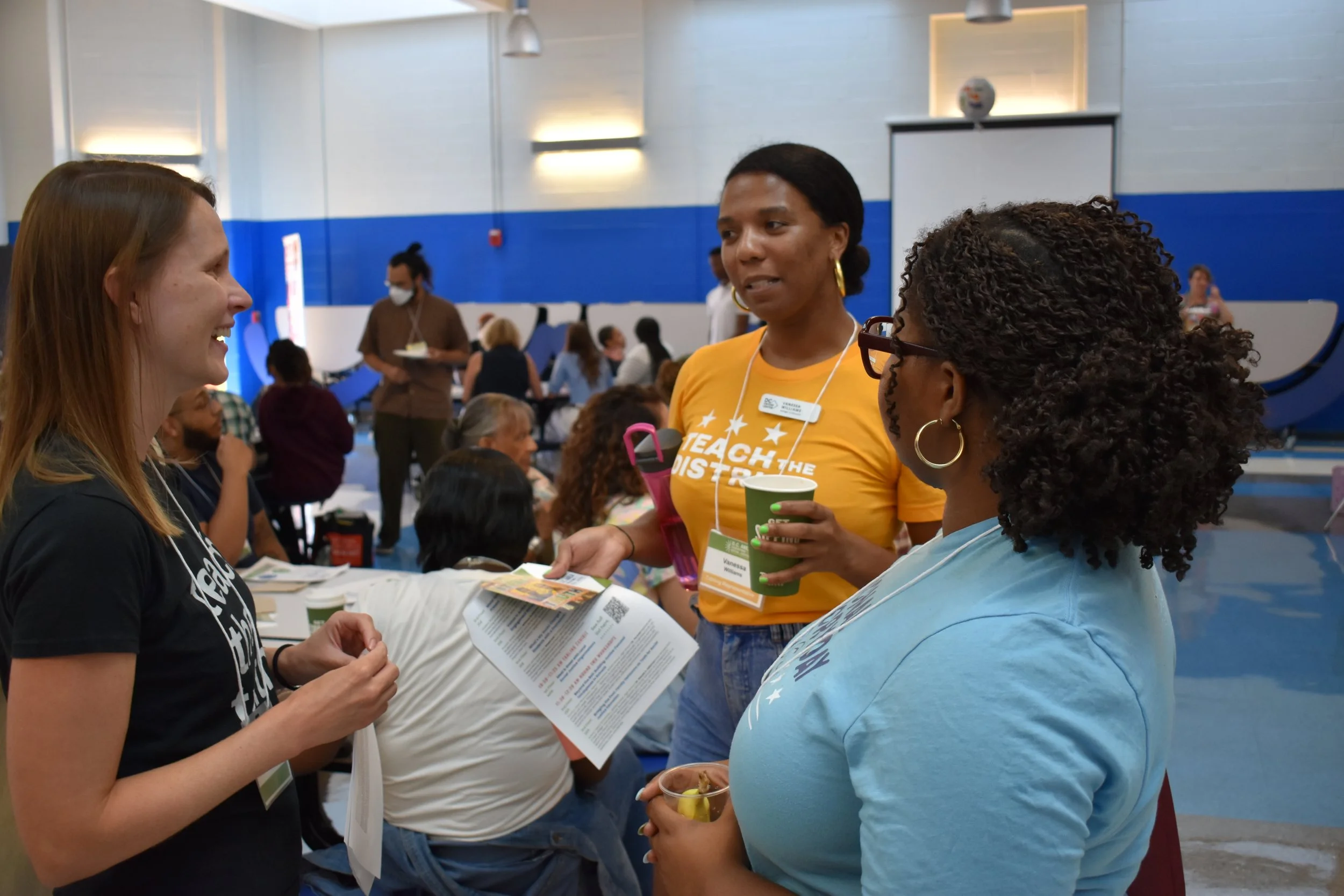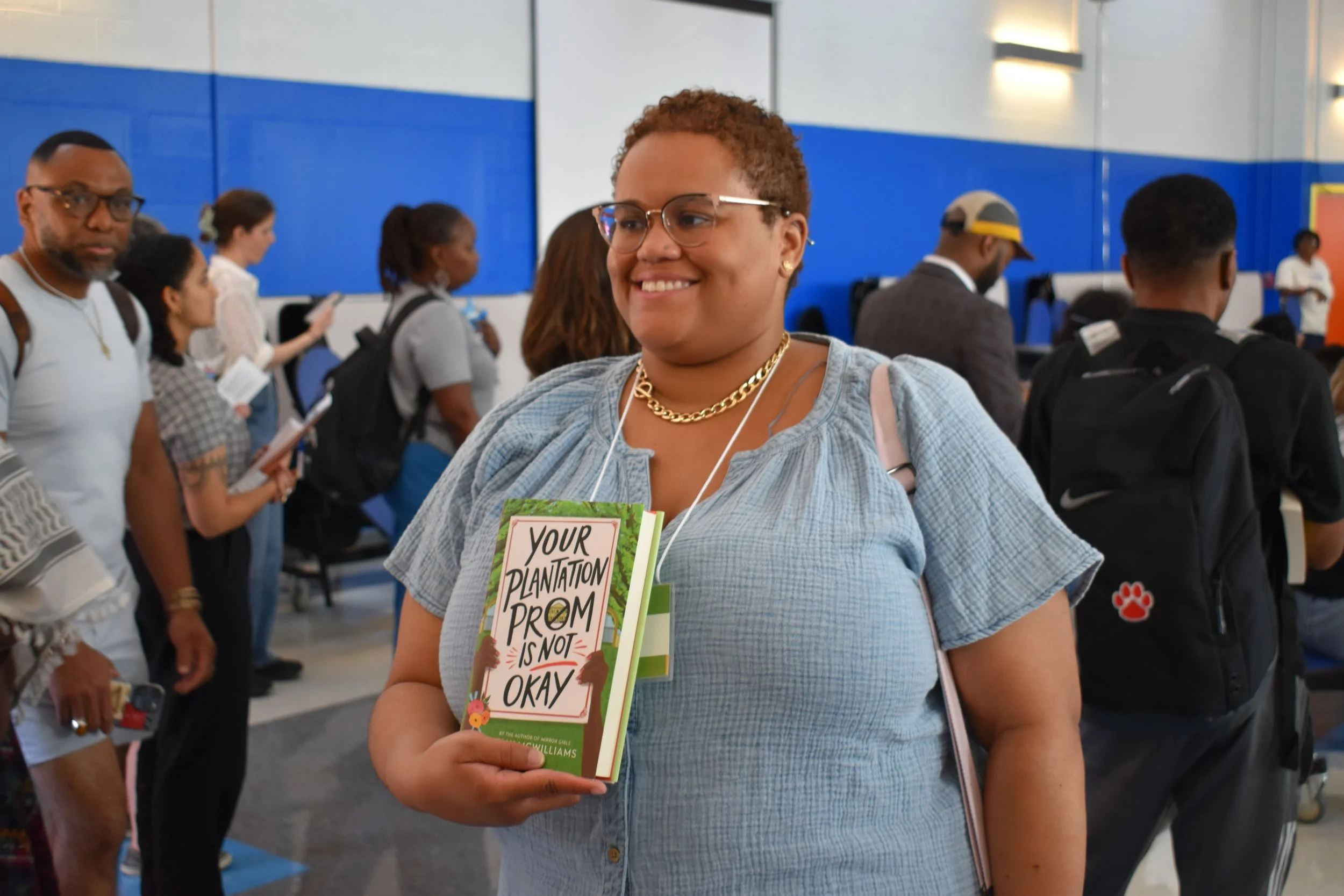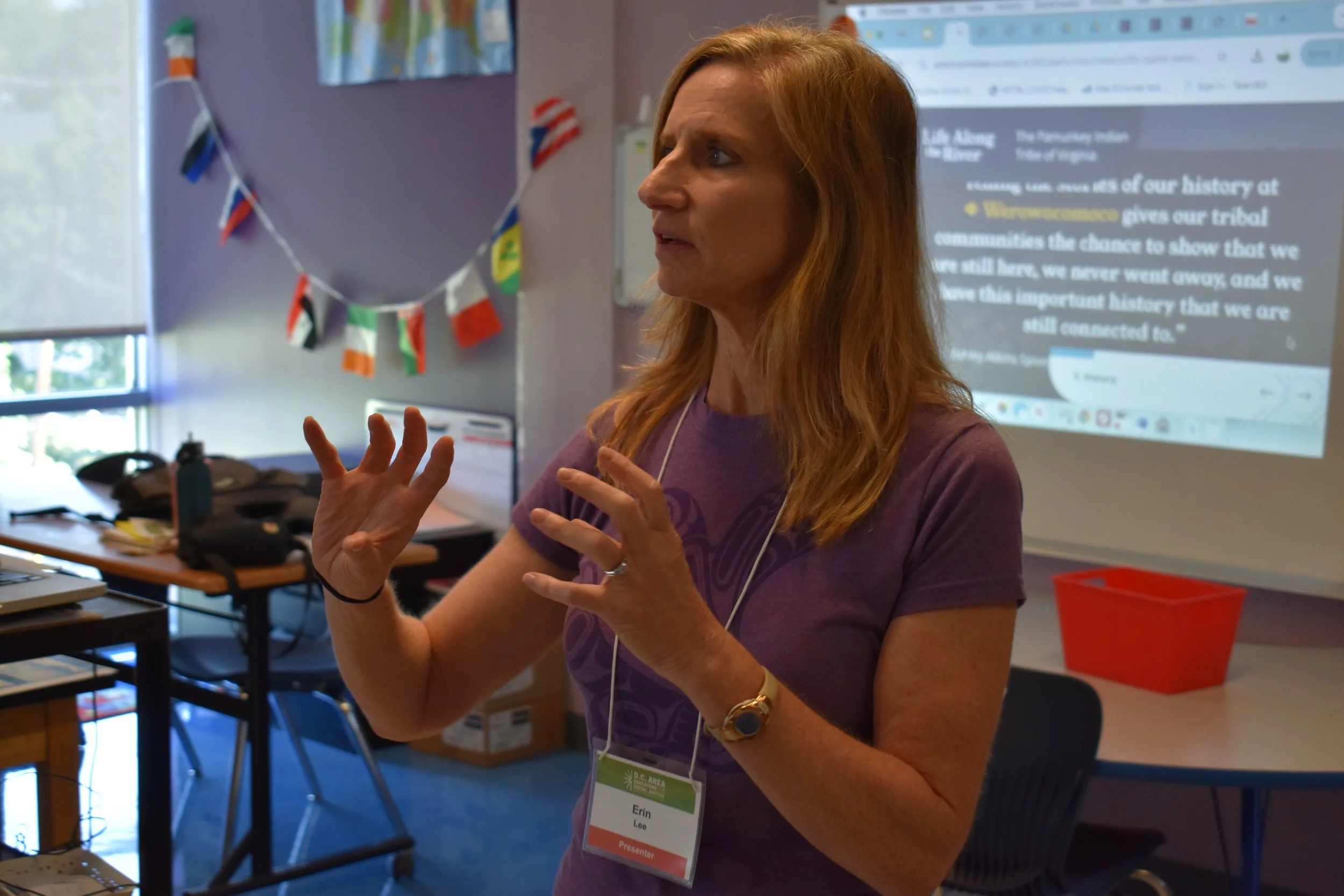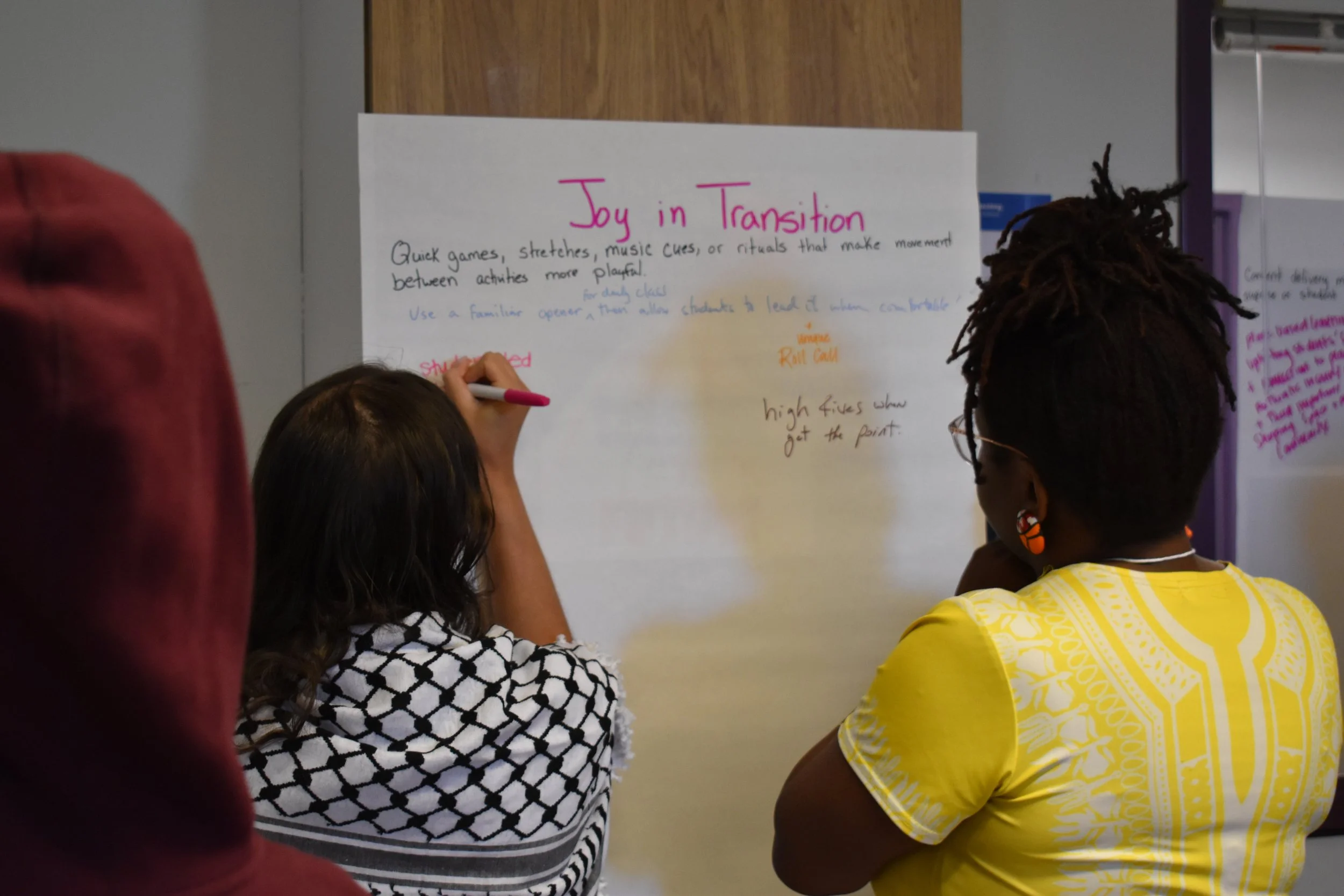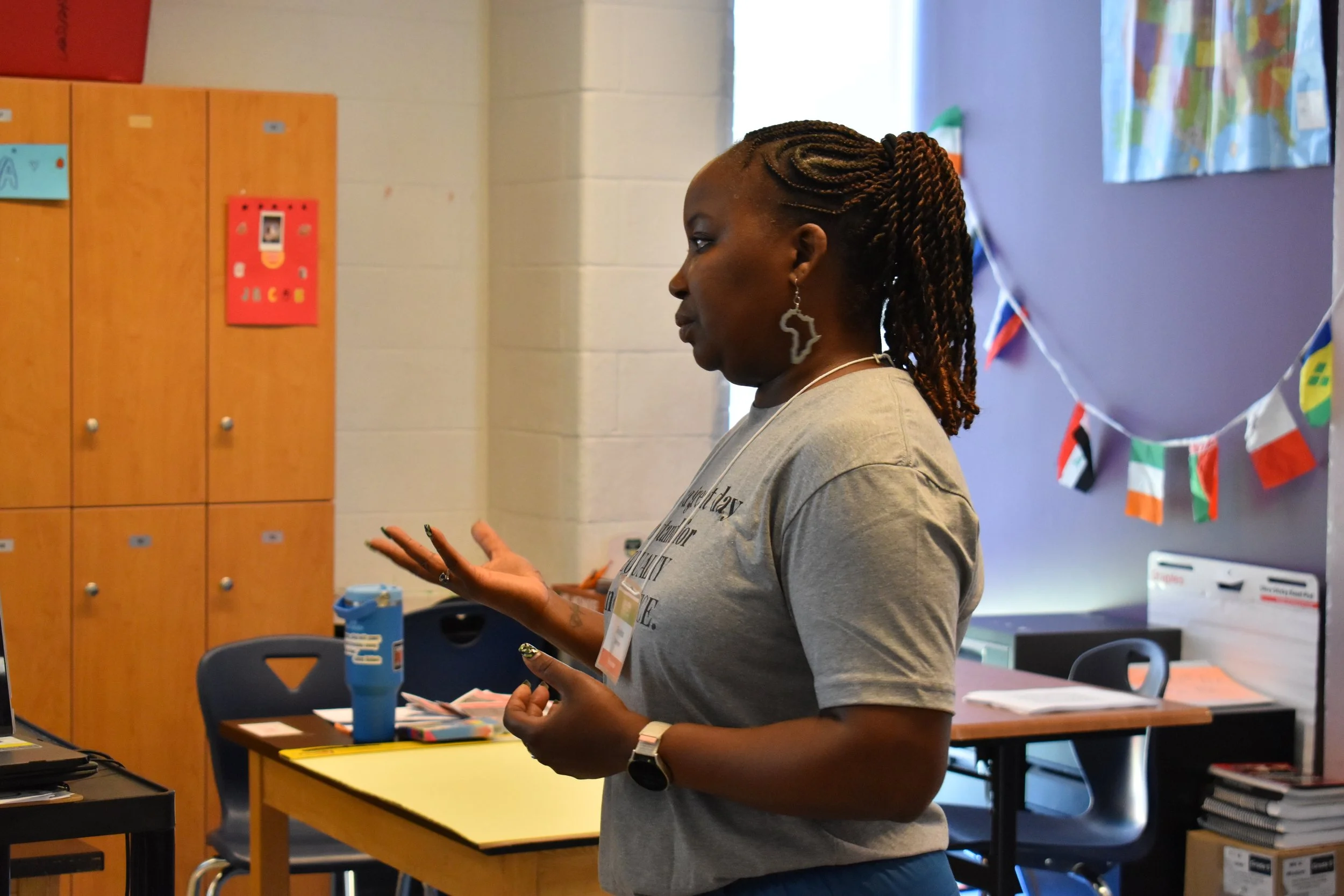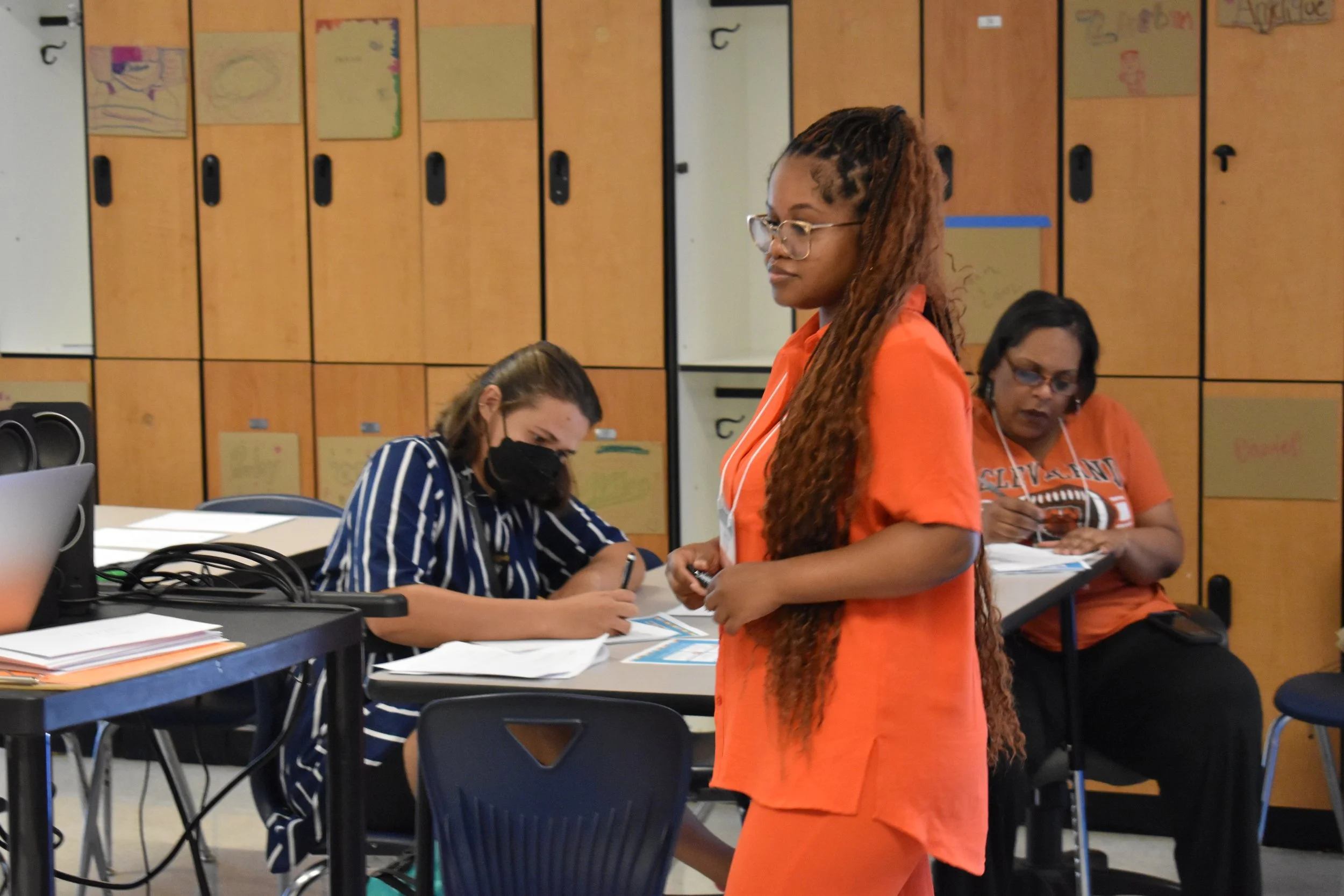Guided by Love: D.C. Educators Gather to Center Justice in the Classroom
On Saturday, August 23, D.C. Area Educators for Social Justice (DCAESJ) hosted the fourth annual Social Justice Curriculum Fair at Inspired Teaching Demonstration School. Educators from all over the D.C. area — and a few from Philadelphia, New York City, and New Jersey — gathered to participate in powerful educator-led workshops, connect with local organizations supporting social justice education, and learn more about DCAESJ in preparation for the 2025–2026 school year.
This year’s theme, Guided by Love was both a call to action and a love letter to the truthtellers who serve our young people and communities every day. The theme also served as a reminder that anti-racist teaching is guided by love.
Keesha Ceran, deputy director of Teaching for Change, and Dwayne Lawson-Brown, author of three poetry collections, grounded attendees in how this year’s fair honors the radical, everyday love that educators show by teaching truth, affirming students’ identities, and refusing to let injustice go unchallenged in their classrooms. Keesha stated,
Through building an educator community with curriculum collaboration, professional learning, and activism, teachers in the D.C. area have created a space to nurture the lives of their students and thrive in their praxis.
This event was for teachers who know that love is not passive. It is organizing, reimagining, and resisting. It is lesson planning late into the night, fighting book bans, and making space for every child to feel seen and valued. The resources provided by the diverse workshops and dozens of local social justice organizations encouraged teachers and students to question and re-think the world inside and outside their classrooms, build a more equitable, multicultural society, and become active global citizens.
The positive feedback received from participants underscores the inspiration and valuable insights they gained from their attendance. We hope these few highlights encourage you to attend next year’s fair!
Thank you for creating this space! I have gathered so many practical ideas from people already doing the work to enact change in my school context with co-conspirators. I was especially surprised and appreciative of the overall theme of being pro-Palestine, anti-racist beyond the base level, leftist values presenters and participants shared together! It’s not often I’ve been in a space in education where everyone was on a similar base level of understanding! — Lekha Tantry, Washington, D.C.
Great job with the content. It was relevant to the current state of the world and working with my population of students. — Sage Alexander, Washington, D.C.
I loved the collective power of coming together for the purpose of our future. — Brandon Frye, District Heights, Maryland
The fair was so well designed. There was an excellent array of choice sessions to attend. I was able to be in a space with like minded educators and share ideas. I left feeling inspired! — Emily Hawthorne, Washington, D.C.
Partner Organizations
Our appreciation to Inspired Teaching Demonstration School for generously hosting this event for a third year, to event volunteers, workshop facilitators and exhibitors for sharing their expertise and resources, and to everyone who participated. Thank you to the following organizations for donating their time and resources to ensure an enriching experience. A special thank you to Shout Mouse Press for providing a book giveaway for participants.
-
Africa Access (Center for African American Studies - Howard University)
African American Civil War Memorial and Museum
Baltimore Transformative Learning Collective
The Children’s Book Guild of Washington, D.C. (CBG)
The Creative Representation Empire
Inspired Teaching Demonstration School
Workshops
Thank you to all presenters for providing their knowledge and resources. Click on a workshop title to learn more.
A Mindfulness (or Mindless) Practice: Introduction to Slow Stitch
Archives in Class: D.C. Activists Defend Black Communities by Challenging Interstate Highway
Beyond the Bell: Building Justice-Focused Thirdspaces in Schools
Bridging the Past: Family Heirlooms as Tools for Social Justice Education
Capitalism v. Cooperativism: Exploring ways to better democratize your classroom
Co-Creating the Span: Students & Educators as Bridge Builders
Echoes of Activism: Using Oral History Interviews to Craft a Lesson Plan
How to Organize Today: Learning from SNCC Using Primary Documents
Incorporating Native Perspectives: Life Along the River and The Pamunkey Indian Tribe of Virginia
Justice in Action: Equipping Students to Reimagine Democracy
Model Gary Student Convention: Using the Past to Inform the Present
Voices in Action: Amplifying Middle School Civic Engagement through Public Testimony
A Mindfulness (or Mindless) Practice: Introduction to Slow Stitch
SUBJECTS: English Language Arts, History, Science, Mathematics, Arts Education
GRADE LEVELS: Early Childhood, Lower Elementary, Upper Elementary, Middle School, High School, Adult Education
Teachers explored the mindful art of slow stitching — an embroidery practice that values creativity, self-expression, and calm over perfection. The presenter introduced slow stitch as “drawing with a needle” and demonstrated the basic running stitch before showcasing examples of her completed work, including a quilt her students created for African American History Month. Participants shared their favorite colors, received bags of materials, and spent most of the session creating their own pieces while listening to calming music. As they stitched, they reflected on ways to bring this meditative practice into their classrooms to support centering, self-care, and creative expression for themselves and their students. Participants exchanged ideas for incorporating the practice with students and received a list of culturally diverse resources, along with free materials to take home, ensuring they left inspired and equipped to continue their slow stitching journey.
-
Marlena Elmore (she/her) draws upon over 16 years of teaching expertise, including valuable international experience, to help both students and teachers thrive. As a Grade 7 and 8 history teacher and the founder of MAE EdSolutions, LLC, a Washington, D.C.-based educational consulting firm, she is deeply committed to fostering learning environments where everyone feels included and experiences the joy of discovery.
Archives in Class: D.C. Activists Defend Black Communities by Challenging Interstate Highway
SUBJECTS: History
GRADE LEVELS: High School
Educators explored how to bring local history and social justice into their classrooms through the use of archives and primary sources. Miya Upshur-Williams introduced participants to the resources and support available at The People’s Archive, guiding them through a five-step process for creating their own primary source instruction kits. Teachers engaged directly with curated materials and activities about the Emergency Committee on the Transportation Crisis (ECTC), a grassroots coalition that, from the 1950s to the 1970s, successfully opposed a proposed urban expressway in Washington, D.C. Through hands-on exploration, they discovered how ECTC’s advocacy for public transit, civil rights, environmental justice, and D.C. Home Rule can inspire meaningful classroom discussions. By the end of the session, participants felt more confident planning class visits to the archive and incorporating historical documents into their teaching to deepen student engagement with local history and activism.
-
Miya Upshur-Williams (She/Her/They/Them) is an archivist, gardener, and dreamer based in her hometown of Washington, D.C. She possesses over 15 years of experience working in the library and archives fields. Her studies and life’s work center the culture, history, and liberation of Black people globally. She earned her Bachelor of Arts from Sarah Lawrence College and Master of Science in Information for Library and Information Science from Drexel University’s College of Computing and Informatics. At DC Public Library’s local history and Black Studies center, The People's Archive, Miya collaborates with educators to create meaningful experiences for students in the archives.
Beyond the Bell: Building Justice-Focused Thirdspaces in Schools
SUBJECTS: Arts Education, Classroom Engagement, English Language Arts, Science
GRADE LEVELS: Lower Elementary, Upper Elementary, Middle School, High School
Participants came together to explore how “third spaces” foster community, identity, and activism beyond traditional classrooms. Dr. Dolet opened the session by inviting participants to reflect on personal spaces such as parks, libraries, or cafes, where they feel safe to be their whole selves, setting the stage for a deeper discussion of third spaces as socially produced rather than neutral. Drawing on the theories of Edward Soja and Henry Lefebvre, Dr. Dolet highlighted how these spaces can nurture cultural exchange, critical engagement, and student development outside formal learning environments. Participants examined the 3D Liberatory Thirdspace Framework, worked individually to draft ideas for incorporating third spaces into their own teaching or programs, and shared practical examples, such as integrating cultural expression into a “Girls on the Run” program. By the end of the workshop, attendees left with strategies and inspiration to co-create liberatory third spaces that center student voice and community-building.
-
Dr. Tia Dolet (she/her) is an intersectional education researcher, equity strategist, and founder of the Thirdspace Collective Consulting, LLC., an education consulting firm that partners with schools and non-profits to build justice-centered extracurricular programs rooted in cultural responsiveness and youth empowerment. With over a decade of experience advancing college access, workforce development, and educational justice, Dr. Dolet works at the intersection of research, strategy, and practice to transform how schools and organizations support historically marginalized youth. Whether mentoring students, designing programs, or leading educator workshops, Dr. Dolet is driven by the mission to help young people thrive unapologetically in spaces designed with them in mind. She is also the proud aunt of two amazing nieces, who remind her every day why this work matters.
Bridging the Past: Family Heirlooms as Tools for Social Justice Education
SUBJECTS: English Language Arts, History
GRADE LEVELS: Upper Elementary, Middle School, High School
In this workshop, participants explored how family heirlooms can serve as powerful tools for teaching history and social justice. Author Wanda Alderman introduced her book, A Paper Bridge: Love Letters from the Great Migration, sharing slides of her family’s heirlooms and the stories they reveal about both personal heritage and broader social history. She invited educators to reflect on their own family heirlooms and facilitated small-group discussions centered on four love letters written by her grandfather during his 14-year search for stable work in the Great Migration era, reminding participants, “We seldom think of love letters as being written by Black men.” Through guided questions, attendees examined the emotional weight of the letters, the racialized labor systems of the time, and parallels to present-day inequities affecting Black Americans and undocumented immigrant workers. The session closed with Alderman underscoring the importance of collecting and studying family heirlooms with students to affirm Black voices, illuminate structural racism, and provide models of resilience and hope.
-
Dr. Wanda A. Alderman (she/her), a Senior Consultant, author, and urban sociologist, has made a significant impact on race, education, and social equality. With over two decades of experience advising educational institutions, nonprofit organizations, and cultural agencies, she has become a leading figure in issues of equity, historical preservation, and inclusive storytelling. Her book, A Paper Bridge: Love Letters from the Great Migration, is a testament to her innovative blend of archival research and narrative inquiry, which brings to light the lived experiences of Black families during the Great Migration. Her work has not only bridged academic insight with community engagement but has also inspired change in social justice conversations, making her a sought-after voice in public humanities.
Capitalism v. Cooperativism: Exploring Ways to Better Democratize Your Classroom
SUBJECTS: Classroom Engagement
GRADE LEVELS: Early Childhood, Lower Elementary, Upper Elementary, Middle School, High School
Educators examined how capitalism shows up in elementary classrooms and explored ways to replace it with more cooperative, democratic practices. Participants learned a four-question framework to analyze systems: Who designed the system? Who benefits? How are they benefitting? And if the designer were absent, would everyone choose to continue it? Using this lens, they reflected on common classroom management tools like Treasure Boxes and classroom jobs, considering who controls access to resources, why certain systems are maintained, and how they affect students. In small groups, participants shared examples from their own classrooms, discussing how to disrupt or dismantle capitalist elements, infuse cooperativism, and make their classrooms more democratic. Facilitators supported participants in working through cognitive dissonance and encouraged them to use these insights for ongoing self-assessment and transformation.
-
Baltimore Transformative Learning Collective, also known as Bmore Transform, is a cooperative of abolitionist educators who are deeply committed to decolonizing Baltimore’s educational ecosystem. Their innovative, comprehensive youth-serving services are strategically designed to engage, support, and empower every stakeholder in the community. They facilitate programming that fosters meaningful connections and champions growth, equity, and learning throughout Baltimore City. Together, they envision and are striving towards an educational landscape that is inclusive, transformative, and reflective of the rich diversity of their city.
Co-Creating the Span: Students & Educators as Bridge Builders
SUBJECTS: English Language Arts, History, Arts Education
GRADE LEVELS: Middle School, High School
In this session, two lead facilitators guided participants through a dynamic Q&A discussion on building equitable and inclusive educational “bridges.” Founding members of the nonprofit, BRIDGE, joined to share the organization’s mission to close academic and professional achievement gaps within the middle school to college pipeline. These rising juniors launched their own initiative to connect with middle school students near their college campus, American University. This vision stemmed from their own witness, recognizing that education should not be confined to the four walls of the classroom nor be restricted by resource accessibility. Using the metaphor of a bridge, participants examined how pillars represent support systems and the span symbolizes time and continuity in creating meaningful connections between students and educators. The conversation was rich and insightful, with students prompting educators to reflect on the structural supports needed for equity and student voice. The workshop highlighted the importance of co-creating spaces where youth are not just consulted but are active architects of inclusive, justice-focused learning environments.
-
England Meadows (she/her) is a Justice, Philosophy, and Political Science double major at American University and the co-founder of BRIDGE, a student-led initiative in Washington, D.C., dedicated to closing educational opportunity gaps and empowering youth. Guided by the belief that education is the foundation of social and political systems, England emphasizes the importance of connecting education to students’ lived experiences. Her work centers on building programs that amplify youth voices and ensure education is relevant, responsive, and impactful for marginalized communities. In recognition of this commitment, she was selected as part of the 2025 Southern Black Girls Cohort.
Eva Wadley (she/her) is a co-founder of BRIDGE, a student-led nonprofit initiative based in Washington, D.C., dedicated to closing academic opportunity gaps through youth-driven programs. As a double major in Justice & Law and Psychology at American University, Eva combines rigorous research with hands-on leadership in community partnerships—most recently through Women Empowering Nations’ GLOW Global Cohort. She leverages her background in advocacy and her lived experience to co-create educational models that center student voices, amplify underrepresented perspectives, and transform systemic barriers into pathways for real, measurable change.
The Echoes of Activism: Using Oral History Interviews to Craft a Lesson Plan
SUBJECTS: Arts Education, English Language Arts, Science
GRADE LEVELS: Upper Elementary, Middle School, High School
In this workshop, educators explored how oral histories can be used to create meaningful, student-centered lessons that center local voices and social justice themes. Participants engaged with excerpts from the Mind, Body, and Justice Oral History Project and other DC-based archives, practicing deep listening to uncover stories of community care, resilience, and activism. Through discussion and reflection, they examined how these narratives could inform culturally responsive lesson planning, translating the experiences and wisdom of local residents into classroom activities that empower students to connect with their communities and understand history through a social justice lens.
-
Sari Leigh (she/her), aka the Anacostia Yogi, is a health advocate, education administrator and digital media activist living east of the Anacostia River in Washington, D.C. Sari Leigh teaches wellness classes and germinates creative projects that advocate for equitable health and wellness access for residents east of the Anacostia River. Sari recently completed the Mind, Body and Justice Project and the DC Superhero documentary about wellness and activism in Washington, D.C.
Fugitive Pedagogy: Teaching Truth in Tough Times
SUBJECTS: English Language Arts, History, Science, Mathematics
GRADE LEVELS: Early Childhood, Lower Elementary, Upper Elementary, Middle School, High School
Participants explored the concept of “fugitive pedagogy,” inspired by Dr. Jarvis Givens’ work and the historical experiences of Carter G. Woodson in the early 1900s. Facilitator Anne Smith opened with an icebreaker, inviting educators to share what they were concerned or excited about for the upcoming school year, creating a reflective and engaging atmosphere. She emphasized that while standards provide structure, “fugitive teachers” find ways to teach truthfully and authentically, challenging constraints in curriculum that often erase or oversimplify diverse histories, like the McGuffey Reader, which omitted the experiences of many racial, gender, and sexual identity groups. Participants examined their own classrooms, reflecting on representation in images and materials, and discussed strategies to ask higher-order questions that push critical thinking. The session concluded with a “missing piece” activity, where educators analyzed scenarios — such as disparities in STEM career representation — to identify gaps between commonly taught narratives and historical or statistical realities, leaving participants with practical tools to integrate truth-telling and equity into their teaching.
-
Anne Smith (she/her) is an Elementary Teacher of Music in Alexandria, Virginia, where she also serves as an Equity Liaison. She is a composer, poet, playwright and choral director. An advocate for education, equity and excellence she uses the arts to introduce and explore current and historical topics. Dr. Smith studied Music Therapy at Howard University and holds an Ed. D in Curriculum and Instruction from Liberty University. Currently she serves on the VMEA DEI Committee, the National NEA Diversity and Inclusion Council, the D.C. Area Educators for Social Justice, and is the Member at Large for MAC-ASOA. A published author, she is also a columnist for the Journal of General Music Education and has presented workshops at the local, state, and national level.
Incorporating Native Perspectives: Life Along the River and The Pamunkey Indian Tribe of Virginia
SUBJECTS: English Language Arts, History
GRADE LEVELS: Upper Elementary
Erin Lee opened the session with a land acknowledgment highlighting the fact we were standing on Nacotchtank (Anacostan) and Piscataway land. She then guided the conversation with an ice breaker activity and explained. Having volunteered for the National Museum of the American Indian (NMAI), Erin presented various resources from the museum’s website that could be used in teachers’ classrooms. She walked participants through the “Life Along the River” storybook that includes various lesson plans and interactive activities. Erin continued the workshop by introducing participants to a digital map that shows whose native land you’re currently on. She showed participants a video produced by NMAI called “What’s the Story with National Stories?” highlighting the danger of a single story and the importance of questioning sources. With time for questions and comments, participants noted these resources would be helpful in their classrooms with many of them feeling that there was not enough information about native people in their school curriculum.
-
Erin Lee (she/her) has been an elementary educator for over 15 years in Alexandria. Through her teaching of Social Studies and professional development with the National Museum of the American Indian (NMAI), Erin has developed a passion for teaching and learning about Native American history and culture, past and present, and has used NMAI's engaging and dynamic resources with her students.
Intentional Planning: Teaching for Justice
SUBJECTS: Arts Education, English Language Arts, History, Mathematics, Science
GRADE LEVELS: Early Childhood, Lower Elementary, Upper Elementary, Middle School, High School, Adult Education
In this reflective workshop, Tamyka guided educators through a process for planning social justice learning that centers authenticity, care, and student voice. The session began with deep breaths and reflection, grounding participants in the realities and tensions they carry as educators. Tamyka emphasized that social justice teaching is not an add-on but integral to the curriculum, and that teachers do not need to be experts in a topic to learn alongside their students. She shared strategies for leveraging existing resources, partnering with community organizations, and designing projects that foster meaningful learning and action. Drawing on examples from her elementary classroom, Tamyka highlighted rituals such as morning meeting prompts, restorative justice reflections, and student-led initiatives — like kindergarteners observing fourth graders to create a petition promoting empathy in their school. Participants explored reflective planning questions around power, agency, diversity, and care, and engaged in hands-on planning using templates or visioning exercises, followed by peer feedback through a critical friends protocol. The workshop concluded with a thinking routine that prompted participants to articulate shifts in understanding and next steps, reinforcing the power of being a co-learner with students and designing justice-centered learning with intention and joy.
-
Dr. Tamyka Morant (she/her) brings almost 25 years of comprehensive experience as a Black Feminist PK-8 educator in Washington, D.C. Her teaching and learning approach is deeply rooted in the tenets of Black feminism, Black feminist pedagogy, and justice praxis/liberatory education and she is unwavering in her dedication to collaborating with fellow educators, students, families, and community partners to advance educational equity and justice for all students.
Joy Is the Standard: Designing Liberatory Learning
SUBJECTS: Classroom Engagement & Design
GRADE LEVELS: Middle School, High School, Adult Education
Participants explored strategies for bringing joy into learning environments, even amid challenging social and political climates. The workshop emphasized that centering joy is a powerful way to foster healing, community, and liberatory learning while affirming student identities. Kim Kelley opened by showing a video of a youth activist detained by law enforcement, sparking reflection on how fear and trauma can shape students’ experiences at the start of the school year. Participants discussed immediate actions educators can take, including teaching social-emotional skills and connecting classroom practices to school climate outcomes to gain administrative support. The session then moved into a collaborative activity to build a “joy toolkit,” where participants used post-it notes to generate ideas for bringing joy into lessons, transitions, and class culture. Kelley also shared a “30-Day Joy Challenge for Educators,” and participants committed to incorporating small, meaningful acts of joy in their practice. Participants committed to some of the items from the list and collectively agreed that “small joy is still joy!”
-
Kim Kelley (she/her) is a passionate educator at an adult high school in Washington, DC, where she teaches reading, math, and history to adult learners. With deep experience across K–12 and adult education, Kim specializes in designing joyful, inclusive, and culturally responsive learning environments for students who have experienced educational trauma. Her interdisciplinary lessons weave together academic skill-building, creative expression, and community care, always centering joy, curiosity, and a sense of belonging. Kim also leads professional development on joyful teaching practices, and her work is grounded in the belief that every learner, regardless of age, deserves rigorous instruction, meaningful connection, and the chance to feel brilliant. She brings a lens of trauma-informed care, special education expertise, and a commitment to racial and educational justice to every classroom and conversation.
Justice in Action: Equipping Students to Reimagine Democracy
SUBJECTS: History
GRADE LEVELS: High School
In this workshop, educators explored strategies to empower students as active participants in democracy and social justice. Using the Democracy Action Card, participants learned how to spark critical inquiry and connect classroom learning to real-world civic action. The session emphasized centering student voice and lived experience, guiding educators in designing lessons and projects that encourage youth to challenge injustice and envision a more equitable society. Through discussion and hands-on activities, participants gained practical tools to embed anti-racist, justice-focused civic learning in their classrooms, leaving inspired to support students as agents of change in their communities.
-
Dr. Shelina Warren (she/her) is an Army veteran and social studies educator with 22 years of experience. Currently in her tenth year at Dunbar High School in Washington, DC, she teaches Constitutional Law, Law & Justice Advocacy, Youth Justice, and Human Rights and Social Action. Dr. Warren is also the director of the Eleanor Holmes Norton Law and Public Policy Academy, fostering student voices for change. She holds multiple degrees, including a Doctorate in Urban Leadership from Johns Hopkins University. Dr. Warren is a National Board Certified teacher, with numerous awards such as the 2022 American Civic Education Teacher Award and the 2021 DC Teacher of the Year Finalist. Before moving to DC, she taught high school Civics, Economics, and gifted K-6 students in Arkansas.
Model Gary Student Convention: Using the Past to Inform the Present
SUBJECTS: English Language Arts, History, Science, Mathematics, Arts Education
GRADE LEVELS: Middle School, High School
T.J Whitaker guided participants through the values and mission of the Model Gary convention. He began his workshop by showing a video from the National Black Convention. This gathering, hosted in 1972 in Gary, Indiana, brought around ten thousand African-Americans to discuss and advocate for Black communities undergoing significant economic and social crises. T.J. explained that the Model Gary conference is inspired by the National Black convention and Model UN with the aim of teaching students research skills and public speaking. Students choose a theme such as politics, the prison industrial complex, arts, and research and write a position paper and resolutions to present to the committee. The Model Gary Convention centers Black culture and issues and challenges students to think of creative solutions to our current-day problems.
-
T.J. Whitaker (he/him) is a longtime teacher of ELA and Social Studies in Maplewood, New Jersey. He is also cofounder of MapSO Freedom School, a teacher collective whose mission is to provide racial justice education to students, educators, parents, and the community.
SNCC: How to Organize Today: Learning from SNCC Using Primary Documents
SUBJECTS: History
GRADE LEVELS: Middle School, High School, Adult Education
Led by Student Nonviolent Coordinating Committee (SNCC) veteran Judy Richardson and activist-educator Jessica Rucker, the session used a newly developed 18-page toolkit and the SNCC Digital Gateway to engage participants in hands-on exercises that highlighted grassroots organizing, leadership development, and community-based activism. Educators explored how SNCC’s work in the rural South from 1961 to 1966 went beyond major public events to build sustained voter engagement and empower local communities. Activities included analyzing photographs, studying documents designed for low-literacy learners, and investigating key figures and events through the Digital Gateway. Rather than a traditional lecture, the workshop centered on experiential learning, allowing participants to actively engage with SNCC’s history and consider how its principles of organizing and civic leadership can inform teaching today.
-
Judy Richardson (she/her) was on SNCC staff in Georgia, Mississippi, and Alabama. Her experiences in SNCC continue to ground both her film and education work. She recently co-directed the new visitor center film for the National Park Service’s Frederick Douglass House in Washington, D.C. In 1968, she was a co-founder of Drum & Spear Bookstore, once the country’s largest African American Bookstore. She was on the production team for all 14 hours of the seminal PBS series, Eyes on the Prize, as its series associate producer, then its education director, and then continued to produce documentaries for PBS, the History Channel, and museums. She co-edited Hands on the Freedom Plow: Personal Accounts by Women in SNCC, a compilation of the testimonies of 52 SNCC women. She is a member of the SNCC Legacy Project board, was a Visiting Professor at Brown University, and has an honorary doctorate from Swarthmore College.
Jessica A. Rucker (she/her) is a doctoral student in the Department of American Studies at the University of Maryland, College Park where she is studying Black radicalisms. Jessica is a President’s Fellow, a member of the Phi Kappa Phi Honor Society, a 2023-2025 graduate assistant at the Frederick Douglass Center for Leadership Through the Humanities, and a 2023-2024 DISCO Graduate Scholar. In 2023, she was a summer Tenant Organizing Fellow with DC Jobs with Justice and a 2022-2023 Prentiss Charney Fellow. Prior to Jessica’s graduate work, she was a high school social studies teacher, department chair, instructional coach, and a participant in the 2018 National Endowment for the Humanities Summer Teacher Institute at Duke University. She has also volunteered as a docent at both the National Museum of African American History and Culture and the National Museum of American History. Jessica resides in her home city, the U.S. colony of Washington, D.C., with her loving partner.
Using Zines as Organizing Tools and Spaces to Hold Memory
SUBJECTS: Arts Education, History
GRADE LEVELS: Early Childhood, Lower Elementary, Upper Elementary, Middle School, High School, Adult Education
Participants explored how zines can serve as tools for reflection, memory, and organizing within educational spaces. Using a zine that shared educators’ experiences in D.C. public schools as a starting point, the session examined the pedagogy and organizing framework of feminist scholar Sara Ahmed, particularly her concept of complaints as non-reproductive labor. Educators created their own mini-zines to reflect on their teaching practices, identify what aspects of their work they do and do not wish to reproduce, and consider how these reflections can inform classroom practice or broader organizing efforts in unions and community spaces. The workshop provided a space to honor the stories educators carry, preserve memories of students and families, and think critically about sustaining justice-centered and generative practices in their work.
-
Electra B (she/her) creates art and teaches in Washington, D.C. She has previously taught in Brazil too.
Voices in Action: Amplifying Middle School Civic Engagement through Public Testimony
SUBJECTS: English Language Arts, History
GRADE LEVELS: Middle School
Participants explored how to empower middle school students to engage in civic life through public testimony. Drawing on real-world examples, including 5th graders testifying on gentrification in Ward 4 and 7th graders addressing ICE-related fears, educators learned how to support students in presenting to school boards, advisory neighborhood commissions, and city councils. The session was highly interactive, with participants practicing the testimony preparation process — analyzing data, drafting persuasive narratives, and crafting personal stories for impact. Through these activities, educators gained a framework for connecting classroom learning to community action while developing students’ research, writing, and public speaking skills and affirming their lived experiences and leadership.
-
Brittany Richardson (she/her) is the middle school Social Studies teacher at Center City Public Charter School’s Brightwood campus. She has co-authored the school’s Social Studies curriculum, ensuring culturally responsive and engaging content for her students. A passionate advocate for educational equity, Brittany is a recipient of the DC Teacher Voice Award from EmpowerEd in recognition of her impactful work both inside and outside the classroom. She holds a Bachelor’s degree in Elementary Education from Bowie State University and a Master’s in Education Leadership and Policy from American University.
What's My Social Change Role?
Equipping Teachers and Students with a Framework to Strengthen Ecosystems
SUBJECTS: Classroom Engagement & Design
GRADE LEVELS: Lower Elementary, Upper Elementary, Middle School, High School, Adult Education
Deepa Iyer introduced the Social Change Ecosystem Map as a tool to support personal growth, strengthen school communities, and engage students in social change work. The session began with a reflective activity where participants wrote their boldest visions for the upcoming school year, highlighting themes of community, joy, care, resistance, and growth as guiding values. Deepa then introduced the steps of the framework: defining core values, identifying your ecosystem, mapping your roles, and synthesizing insights. She emphasized the need for collaboration, well-being, and a strengths-based, non-hierarchical approach. Participants identified key roles they play within their educational ecosystems, considered what support they need, which roles they aspire to, and how students might use the framework. Discussions surfaced insights about self-perception versus how others see us, the multiplicity of roles across different ecosystems, and the flexibility to shift roles to meet goals. The workshop included examples from schools where students and teachers have applied the framework to name roles within their communities and in historical contexts. Participants left with practical tools, activity guides, and inspiration for integrating the Social Change Ecosystem Map into classroom practice, including the possibility of hosting Deepa for additional training or reading her book, We Are the Builders.
-
Deepa Iyer (she/her) is a writer, educator, and activist who has supported social movements for 25 years. She developed the social change ecosystem framework, a tool for understanding our social change roles during times of chaos and confusion. Her books include Social Change Now: A Guide for Reflection and Connection and We Are The Builders (a picture book for K-3rd graders).




